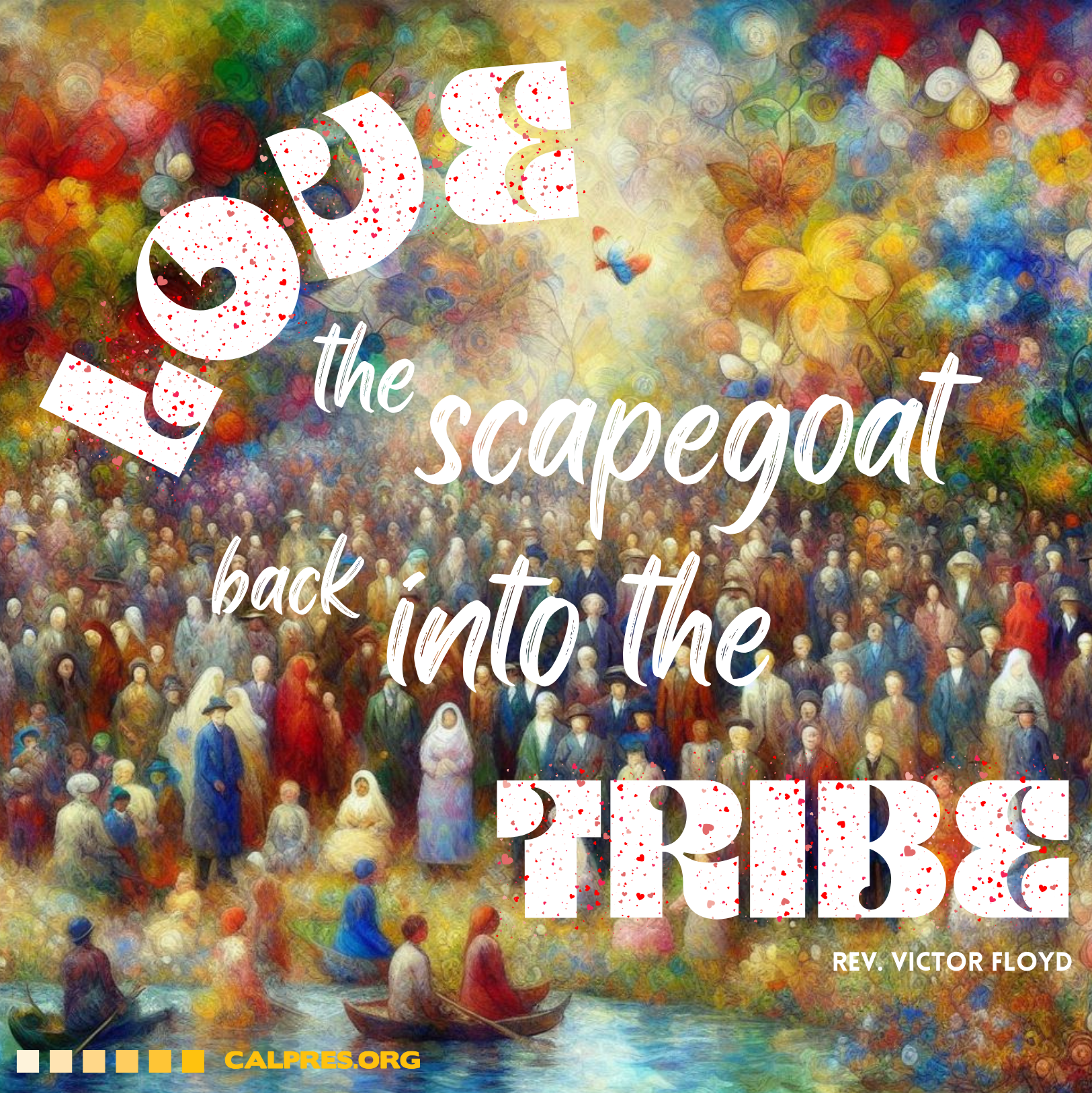Sermon 01.28.2024: Face Your Demons: The Power of Christ Compels You!
Exorcism was to the Early Church as psychotherapy is to us today. In a famous story from Mark's gospel, Jesus helps a very troubled man—a "demoniac"—get unstuck and live a better life. Bring your demons with you this Sunday; there's no place better for them than church!
Scripture
Mark 5:1-20
They came to the other side of the lake, to the country of the Gerasenes. And when he had stepped out of the boat, immediately a man out of the tombs with an unclean spirit met him. He lived among the tombs; and no one could restrain him any more, even with a chain; for he had often been restrained with shackles and chains, but the chains he wrenched apart, and the shackles he broke in pieces; and no one had the strength to subdue him. Night and day among the tombs and on the mountains he was always howling and bruising himself with stones. When he saw Jesus from a distance, he ran and bowed down before him; and he shouted at the top of his voice, ‘What have you to do with me, Jesus, Son of the Most High God? I adjure you by God, do not torment me.’ For he had said to him, ‘Come out of the man, you unclean spirit!’ Then Jesus asked him, ‘What is your name?’ He replied, ‘My name is Legion; for we are many.’ He begged him earnestly not to send them out of the country. Now there on the hillside a great herd of swine was feeding; and the unclean spirits begged him, ‘Send us into the swine; let us enter them.’ So he gave them permission. And the unclean spirits came out and entered the swine; and the herd, numbering about two thousand, rushed down the steep bank into the lake, and were drowned in the lake.
The swineherds ran off and told it in the city and in the country. Then people came to see what it was that had happened. They came to Jesus and saw the demoniac sitting there, clothed and in his right mind, the very man who had had the legion; and they were afraid. Those who had seen what had happened to the demoniac and to the swine reported it. Then they began to beg Jesus to leave their neighbourhood. As he was getting into the boat, the man who had been possessed by demons begged him that he might be with him. But Jesus refused, and said to him, ‘Go home to your friends, and tell them how much the Lord has done for you, and what mercy he has shown you.’ And he went away and began to proclaim in the Decapolis how much Jesus had done for him; and everyone was amazed.
Sermon Text
Introduction (Welcome): Early Church Exorcisms
Church historian Rita Nakashima Brock, in her book [with Rebecca Parker] Saving Paradise [2], describes the Early Church’s very common practice of exorcism as akin to group therapy. By “Early Church” I am referring to the first couple centuries after Jesus’ death and resurrection. The Early Church happened before Roman Emperor Constantine coopted Christianity as an expedient route to power and empire. In the Early Church, everyone had to undergo exorcism not because their heads were spinning around spewing pea soup but because they were regular people. And regular people have demons.
The Early Church required up to three years of training for new members. The prospective member had to know all about Jesus, learn the theology, the hymns, etc. They learned to follow the example of Jesus while the gospels were still being composed! For centuries, our faith was passed down through relationship and experience. Faith is made from relationship and experience.
Regular exorcism was part of that. It was like group therapy. You had to get control in order to make new, moral choices. Every prospective member had to face their demons. We call this psychotherapy now. It used to the purview of religion. Psychotherapy is no longer the purview of religion.[3]
Exorcism was an important part of deciding to get baptized. After the long process, if you were still interested, you applied again with new character references. If the bishop approved, the catechumens then fasted and prayed during the time leading up to Easter.
On what we now call Holy Saturday—Easter eve—in the middle of the night, the community would gather, the catechumens would strip naked and go through the cold waters of baptism, to be reborn and received into the group with a white robe of glory, to symbolize the Holy Spirit.
For the Early Church, salvation meant living together with the Holy Spirit, a kind of paradise that could not be achieved by any individual. There was no such thing as “my personal Lord and Savior.” There was only the community, a garden of the Holy Spirit, where everybody struggled to be better people.
I. Madness Among the Tombs
As she drove me to my weekly piano lesson in Rome, Georgia, my mother made a point of driving by the big cemetery where an old man sat among the graves, in a folding chair, wearing his church clothes. The story went that he sat there facing his wife’s grave and spoke with her at length every afternoon. Rain or shine he sat there. My mother wanted me to witness him, as if to support him—this man who, like herself, had been scarred by the sorrow of living on this earth.
Is that how the man in Mark’s fifth chapter winds up among the tombs? His community, including his friends, had tried to chain him there. I find it hard to believe they couldn’t come up with a chain strong enough. They knew him and how he wouldn’t hurt them, but they felt unsafe with him roaming the neighborhood, ranting and howling. He was sick in his spirit. He had mental health problems, like one in every five adults [4] or two in every five high school [5] students.In Bible speak “unclean” simply means sick. The mentally ill Gerasene bruises himself with stones, as if to punish himself, to stone himself.
As an HIV+ gay man approaching sixty, I identify with this man living among the tombs.
I have lived longer with HIV than without it. And yes, my physical health is great. This sermon is about mental and spiritual health.
I still grieve for so many who died so young. How they were persecuted as they died! Sometimes I wonder why I made it. Perhaps it’s so that I can preach this sermon and tell you that complicated [6] grief, like a chronic [7] disease, is not a fatal condition. It’s fluctuates—good days, bad days—but it’s manageable through medication.
Untreated serious mental illness [8] is life-threatening. My friend, the Rev. Thomas Crosby, is the chaplain at a psychiatric lockdown hospital on the Peninsula. Thomas teaches his patients that taking their essential medications must become their spiritual practice. I feel like Jesus would love Thomas’ life-giving approach! I also feel like someone here needs to hear me say this: take your medication, and stay alive. Let God heal you and use you to heal this world.
II. Superstitions That Bind Us & Other Political Considerations
Our cultural misconception of biblical demon possession was solidified by the 1973 movie, The Exorcist, where a dashing priest launches spiritual warfare against, you guessed it, a teenage girl who levitates and curses and vomits pea soup. Of course the movie was a sensation.
I begged my mother to take me to The Exorcist. I was nine and had undeveloped tastes. My friend’s mother wouldn’t even let him listen to the movie’s theme song. [Michael begins playing “Tubular Bells.”] When it came on the radio, she would turn it off. No, Michael. Stop. [He plays louder.] The power of Christ compels you! [Michael stops.] [9] Let’s demystify something here and now: There is no devil music! (But some polka bands come close. [10]) You will realize the timeless relevance of the old, old story by freeing yourself from superstitious traditions.
Sister Tosca Lee and I talk about freedom all the time. We can’t describe it. Don’t try to make us, but we’ve both gotten to freedom through the mercy of God. Once you’ve experienced freedom in God, nothing else can compare.
The demoniac recognizes Jesus and calls him by name. So does the demon in Chapter 1 of Mark’s gospel. How is it that demons know Jesus better than the crowds! The Gerasene demoniac even bows before Jesus and begs for mercy. Jesus doesn’t shy away. He engages the mentally ill. He conducts an intake interview, like any good healer, but he doesn’t get past the first question. Q: Name? A: Legion, for we are many.
Ancient Politics
The name Legion is a clear reference to the occupying Roman forces. The gospel’s political preferences are thinly-veiled in symbols, actions and well-calculated aggressions. The imperial Legion goes down with the (other) unclean animals into the sea. Now, the Empire understood that the Early Church was about building a world of shared power and shared goods. [11] The religious leaders of Jesus’ day (willfully) misunderstood his message that salvation was about living together in peace, starting here, in this world.
The old system is about power over. Jesus is about power with. [12]
Peppa & Her Ilk
Legion, representing the great imperial oppressor, negotiates passage from the Gerasene Demoniac into the pigs. Now, about these pigs. Though deemed unclean and forbidden in Judaism and later in Islam, pigs were part of the local Gerasene economy. These two-thousand pigs could feed “legions” of Roman soldiers as they passed through town. But when overtaken by demons, they fling themselves—along with the demons—into the sea. [13] The traditional interpretation goes that the pigs and demons were drowned in the Sea of Galilee, but did you know that pigs are excellent swimmers? [14] [Michael plays another snippet of “Tubular Bells.”] Oooh! The Gersasene Demoniac Part 2!
The swineherds (pig shepherds) ran off and came back with a crowd who began to ask Jesus when he would be leaving their once-idyllic enclave. The morning headlines read: [15] JESUS DESTROYS LOCAL ECONOMY / JESUS CARES ABOUT DEMONS, NOT HARDWORKING PEOPLE. The whole neighborhood was outraged.
III. The (Inescapable?) Human Scapegoat System
Anthropological philosopher René Girard theorized that mimicry [16] or group assimilation is a natural step in the organizing of any system of people. Girard shows how human beings do not naturally organize for something as efficiently as we organize against something. Fear and anger are easy motivators. Hope and faith, though, require more of us. For those who want to declare unity without putting in the work, the real truth just takes too long.
Think about a disorganized group of people. Through imitation the chaos of individual against individual eventually can “become the unity of all against one—the principle of the scapegoat.” [17] Girard believed that “out of the corpse of the scapegoat victim grows the sacrificial cult which is the origin of every society.” [18] How have the people in Mark 5 unified the neighborhood? By condemning the demoniac and keeping him around to remind them of their scapegoat system. They can even hear him howling from his place of exile.
Is there a scapegoat in your family? Your office? Your school? Remember the scapegoat in junior high? [If you are the scapegoat, call them on it immediately. You don’t have to live like this.] It’s such an easy system, cruel and childish.
Current Examples
For decades, the power-hungry have tried to designate LGBTQ people as a global scapegoat. They’ve pinned earthquakes and hurricanes on us and accused us of much worse. Rene Girard writes that throughout history, scapegoats are almost always falsely accused of violating children. Since this time last year, state legislatures have introduced over 775 bills [19] targeting LGBTQ people. 275 of those were introduced this year.
Think of all the recent scapegoats: how people of Asian descent are attacked in San Francisco, how Black people are the OG scapegoat, how poor people are somehow blamed with poverty, how Muslims are usually the first suspect, how Jews [20] are pre-OG scapegoat, disabled people mocked at political rallies, the mentally ill derided and yes, immigrants. [21] The City of San Francisco is a scapegoat. Following Tony Bravo’s example, I like to post beautiful pictures of our city with captions like “What a dump” and “Avoid the doom loop.”
Here is where today’s story turns.
Once the demoniac is possessed no more, the people who scapegoated him realize they will now have to live alongside him. Jesus has honored his request not to be deported “out of the country.” (See Mark 5:10.) The scapegoat is coming to dinner! No wonder they’re angry and fearful. The guy who used to howl from the cemetery naked as a jaybird is now legit, a member of the community, restored to good standing.
Jesus has destroyed how they organize their society. Through agape love, Jesus has dismantled their system of tribalism. With God’s help we can dismantle tribalism, too, before destroys our young people, our families, before it destroys our democracy, our government and way of life—and our spirits. We can do it. Jesus just showed us how. Love the scapegoat back into the tribe. Challenge the majority whose power depends on unifying against a scapegoat.
This is why I am a preacher in a system that used to demonize me. I am here to tell you that freedom in Jesus is real, more real than the chains of the past. Salvation means living together with the Holy Spirit, a kind of paradise that cannot be achieved by any individual—the garden of the Holy Spirit, where everybody struggles to be better people, and where serpents still roam. My salvation is intimately woven with your salvation. We can only be saved together.
1 The historicity of this story’s setting in Gerasa is highly questioned. All three synoptic gospels contain versions of this story. I tried to stick to the assignment: Mark. This story is most logically taking place in Gergasa. Rather than Mark’s Gerasa, Matthew places it in Gardasa. Is it a copying error, or does this bit of detail simply not matter to the Early Church communities? Keeping the story alive was more important than canonical consistency. There are three communities with similar names—Gerasa, Gardasa, Gergasa. Only Gardasa is located on the Sea of Galilee. The pigs could have been long-distance runners (being demoted possessed and all), but the biblical texts are contradictory and confusing regarding the location of Legion’s type-scene. See < https://biblicalhistoricalcontext.com/gospels/gerasa-gadara-gergesa-from-where-did-the-pigs-stampede/>
2 Rita Nakashima Brock & Rebecca Parker, Saving Paradise: How Christianity Traded Love for this World for Crucifixion and Empire, Beacon Press, 2008. I cannot recommend this book enough, and it’s in the church library.
3 This statement is especially important for LGBTQ minors who are being forced into “conversion therapies” that deny their God-given sexuality and gender expressions. Conversion therapy is banned in many states because it is psychological child abuse. I have friends who can tell you about conversion therapy from their own experiences. It does not “work” because it is a lie.
4 < https://www.cdc.gov/mentalhealth/learn/index.htm#:~:text=How common are mental illnesses,a seriously debilitating mental illness.>
5 < https://www.cdc.gov/healthyyouth/mental-health/index.htm>
6 Complicated grief is an actual psychiatric diagnosis. < https://www.mayoclinic.org/diseases-conditions/complicated-grief/diagnosis-treatment/drc-20360389#:~:text=Complicated grief may be considered,and debilitating beyond 12 months.>
7 Like diabetes or asthma, HIV is now considered a chronic disease thanks to innovations in pharmaceuticals. There are still side effects and other complications, but we live in miraculous times.
8 < https://www.va.gov/PREVENTS/docs/PRE013_FactSheets_SeriousMentalillness_508.pdf>
9 The lightness of this moment is meant to illustrate how we should regard superstition in the church. There is nothing more Reformed than banishing all superstition. See John Calvin’s Institutes, Chapter 4. < https://reformed.org/books/institutes/books/book1/bk1ch04.html#three.htm>
10 The Chardon Polka Band, Polka Praise, is a hoot. < https://chardonpolkaband.com/playlist/the-chardon-polka-bands-old-time-tent-revival/>
11 Christian welfare and wealth redistribution is described clearly in Acts 4:37-37. “There was not a needy person among them, for as many as owned lands or houses sold them and brought the proceeds of what was sold. They laid it at the apostlesfeet, and it was distributed to each as any had need. There was a Levite, a native of Cyprus, Joseph, to whom the apostles gave the name Barnabas (which means son of encouragement). He sold a field that belonged to him, then brought the money, and laid it at the apostlesfeet.”
12 Of courseI am describing my sense of low Christology (the human nature and pragmatic teachings of Jesus). In another very real sense, he is the Cosmic Christ, seated at God’s right hand, etc.
13 St. Augustine of Hippo used this scripture to justify the killing of animals. I hate to disagree with Augustine, but I disagree. A lot.
14 < https://a-z-animals.com/blog/yes-pigs-can-swim-facts-about-these-strong-swimmers/#:~:text=Pigs are excellent swimmers that,if thrown into the water.>
15 https://spiritandtruthpublishing.com/blog/pigs-and-chains-mark-5/
16 Mimesis < https://en.wikipedia.org/wiki/Mimesis>
17 René Girard, The Scapegoat, Hopkins Press, 1989. Read this book.
18 Ibid.
19 < https://thehill.com/homenews/lgbtq/4412024-state-legislatures-bills-targeting-lgbtq-rights/>
20 Christianity is guilty of anti-Semitism. Did you know that the name Judas means “Jew”? Antisemitism is canonized in our scripture.
21
For whom the former president of this country promises to build concentration camps is re-elected. < https://www.reuters.com/world/us/trump-plans-sweeping-undocumented-immigrant-roundups-detention-camps-report-2023-11-11/#:~:text=He would ease the strain,first term, the Times said.>

Art by Rachel Wolf











